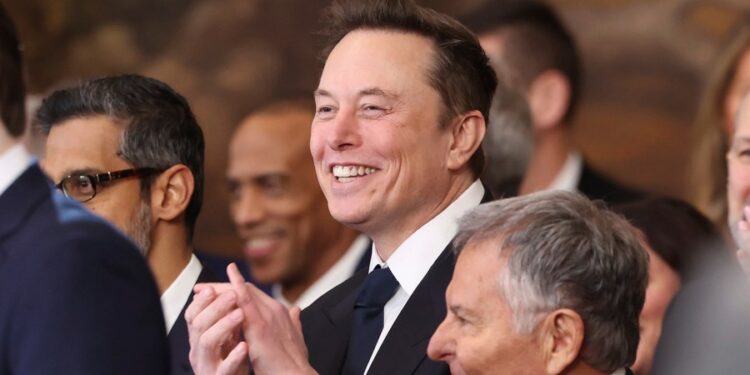
(The Hill) — GOP senators are “terrified” over the prospect of facing primary challengers funded by Elon Musk if they stick their necks out by opposing President Donald Trump’s agenda.
The White House has signaled that Republicans who thwart Trump’s agenda by voting against his controversial nominees or opposing efforts by Musk to freeze government funding and slash federal agencies, such as the U.S. Agency for International Development, will pay a political price.
And that’s a threat that carries a lot more weight when Musk, the world’s richest man, could easily pour tens of millions of dollars into a Senate Republican primary.
Musk warned Republican lawmakers in December that he was compiling a “naughty list” of members who buck Trump’s agenda. He also pledged shortly after Election Day that his political action committee would “play a significant role in primaries” next year.
At the time, the threat was seen mostly aimed at rebellious House conservatives who loomed as an obstacle to reelecting Speaker Mike Johnson (R-La.) and threatened to derail Trump’s tax agenda by insisting on major spending cuts.
But Republican senators have taken Musk’s warning to heart.
“That’s one of the reasons why you see people who are close to an election, [Sens.] Bill Cassidy [R-La.], Thom Tillis [R-N.C.], voting for certain nominees,” said one Republican senator who requested anonymity to discuss the recent votes of GOP colleagues.
“The White House hasn’t been too subtle about that. I think they’ve been fairly threatening,” the lawmaker added, noting that Cassidy already faces a primary challenge from Louisiana state Treasurer John Flemming.
Since the inauguration, GOP senators have dutifully voted to confirm Trump’s most controversial Cabinet nominees, such as Pete Hegseth, who now leads the Pentagon, and Russell Vought, who will take over the White House budget office.
Tillis, who is up for reelection in 2026, wavered on voting for Hegseth but finally announced his support for the embattled nominee after Hegseth posted a letter on social media denying allegations of abusive behavior and drunkenness made in a sworn affidavit by his former sister-in-law.
Sen. Joni Ernst (R-Iowa), who is also up for reelection next year, initially said she wasn’t ready to support Hegseth in a Dec. 5 interview on Fox News. That ambivalence was met by a strong social media backlash from Trump supporters.
The next day, Iowa Attorney General Brenna Bird (R) called out “DC politicians” for thinking “they can ignore the voices of their constituents and entertain smears,” though she didn’t name Ernst in her column for the conservative website Breitbart.
A Democratic senator who organized opposition to Trump’s nominees said the threat of Musk-backed primary challengers helped Hegseth win confirmation and put two other controversial nominees — Tulsi Gabbard, who was tapped to serve as director of national intelligence, and Robert F. Kennedy Jr., who is slated to head the Department of Health and Human Services —on the path to being confirmed.
“I think my colleagues are under pressure to object occasionally but not too often,” the senator said, referring to conversations with Republican colleagues.
“They’re all terrified of the power he’s wielding right now,” the Democrat said of Musk’s alliance with Trump.
Gabbard and Kennedy received unanimous Republican support in the Intelligence and Finance committees, respectively, and are expected to win confirmation next week.
Cassidy, the chair of the Senate, Health, Education, Labor and Pensions Committee, said he was “struggling” over Kennedy’s nomination but eventually voted to report him to the floor.
A second Republican senator who was involved in the confirmation process said Musk’s threat to fund primary challengers has weighed on colleagues who initially balked at Trump’s most controversial nominees.
“He’s talked about that,” the senator said of Musk’s threat to primary GOP lawmakers who vote against Trump’s agenda.
The senator noted that Trump supported Sen. Lisa Murkowski’s (R-Alaska) primary challenger in 2022 after she voted to convict him on the impeachment charge of inciting insurrection, but the Alaska senator still won the nomination.
But that was without Musk on his side to provide tens of millions of dollars to settle his political vendettas.
“The president’s gotten involved in primaries but money does count,” the senator said.
Musk spent at least $288 million to help elect Trump and other Republican candidates in 2024, according to The Washington Post’s analysis of public campaign finance reports.
Trump also called for a primary challenge against then-Sen. John Thune (R-S.D.) in 2020 after Thune vowed to oppose an effort by Trump’s allies in Congress to object to the certification of Joe Biden’s election victory. That threat didn’t amount to anything as Thune cruised to an easy reelection in 2022.
Republican senators took a more aggressive stance against Trump’s first nominee to head the Justice Department, former Florida Rep. Matt Gaetz (R-Fla.). Gaetz withdrew his name from consideration on Nov. 21 after Republican senators made it clear to Trump he was unacceptable.
But the political environment in the Senate Republican conference changed after Republicans who expressed doubts and concerns about Hegseth were met with strong pushback from Trump allies on social media.
Pro-Trump activist Charlie Kirk, the founder of Turning Point Action, a group that mobilized voters for Trump in the 2024 election, warned that “funding is already being put together” and that “primaries are going to be launched.
He signed out Ernst, Tillis and Sen. Mike Rounds (R-S.D.) as possible targets.
Three Republicans, Sens. Susan Collins (Maine), Mitch McConnell (Ky.), the former Senate GOP leader, and Murkowski voted against Hegseth.
But either way, the pressure campaign to get Hegseth across the finish line struck a note in the Senate.
A third Republican senator said even if Trump stays neutral in a Senate GOP primary, there’s growing concern among colleagues that ultra-wealthy donors and grassroots activists could mount formidable primary challenges to punish perceived disloyalty.
“Him staying out of a race doesn’t mean his following would and they have significant capabilities,” the lawmaker said, adding that Musk’s wealth makes primary threats “a bigger deal.”







